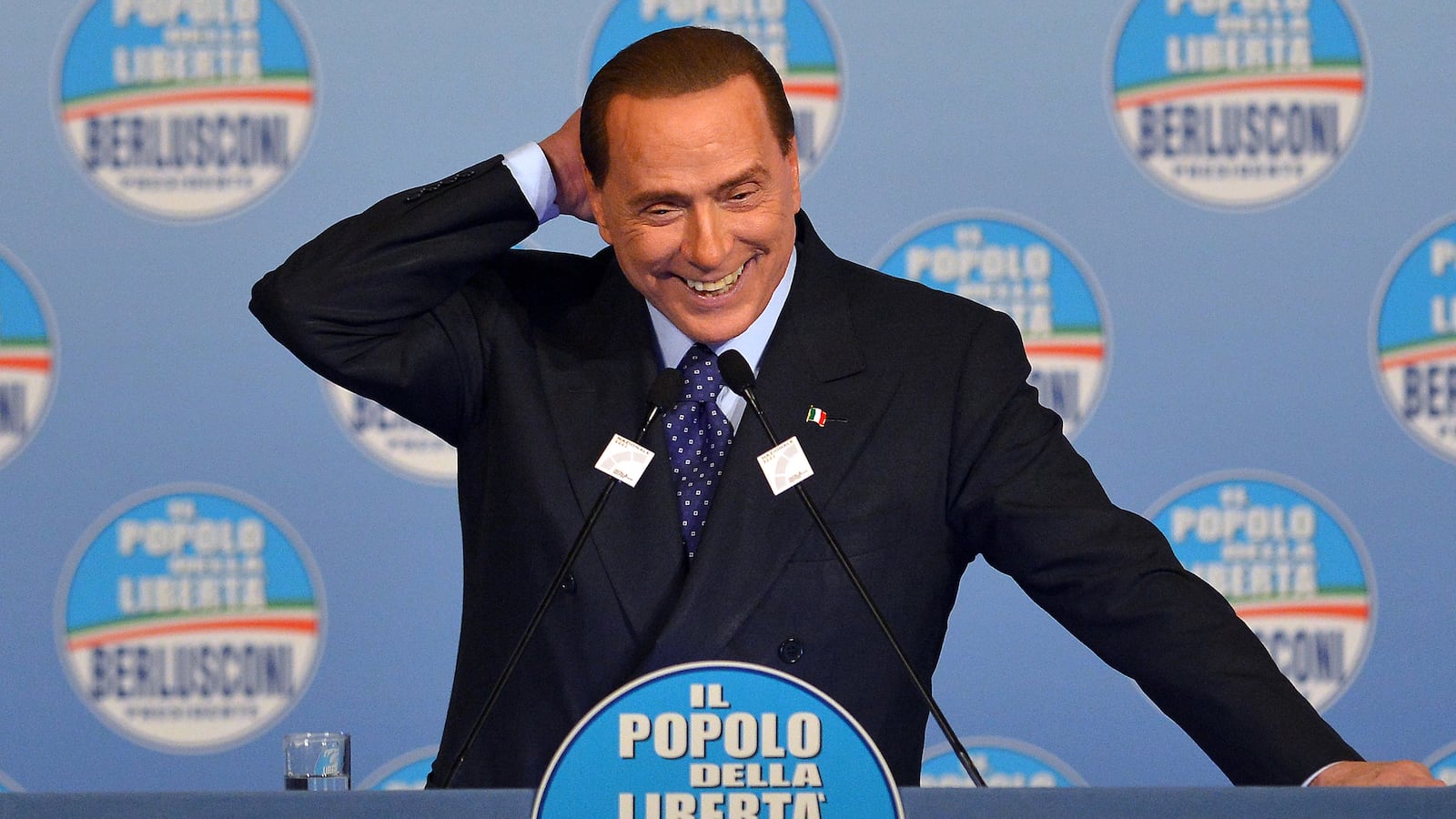Silvio Berlusconi certainly knows how to typecast his potential constituency. The 76-year-old media mogul and four-time prime minister running for election in late February has been pandering to demographic categories on the campaign trail recently—and it just might be working.

Over the weekend, he uttered cringeworthy praise of Italy’s disgraced Fascist leader Benito Mussolini at an event meant to commemorate the victims of the Nazi Holocaust. He did fault Mussolini for allying with Nazi Germany, but in what many see as an apologist statement aimed at the extreme-right contingent of undecided voters, he gave Il Duce moderate praise. “The racial laws were the worst fault of Mussolini as a leader, who in so many other ways did well,” he told reporters on the sidelines of the ceremony. The comment caused outrage from Italy’s Jewish community leaders who were commemorating the solemn fact that Mussolini sent more than 10,000 Jews to Auschwitz between 1943 and 1945. “This is a day that should make us reflect on how humanity can fall into such an abyss,” said Pier Luigi Bersani, the center-left candidate Berlusconi must beat to make a political comeback. “Berlusconi has used it as an electoral maneuver to win a few votes from the fascist right.”
With the fascist vote seemingly sorted, Berlusconi then went on to the job of seducing undecided soccer fans by finalizing the deal to sign soccer badboy Mario Balotelli to his AC Milan squad. Balotelli, a star striker born in Palermo, Sicily, has earned a reputation that would make even Berlusconi blush. His sexual antics and outrageous behavior have been tabloid fodder in England, where he has been playing for Manchester City since 2010. But his performance in last year’s UEFA Cup for Team Italy earned him the nickname Super Mario and national acclaim. But Balotelli’s hallowed return to Italy is seen by Berlusconi’s opposition as a below-the-belt shot at getting votes. This is a country, after all, where soccer allegiance is second to nothing.
Berlusconi’s investment of €20 million for Balotelli may not help AC Milan, which is lagging in fifith place after winning the 2011 Italy championship handily, but it will most certainly help Berlusconi. Just the announcement of Balotelli’s return gave the former prime minister a jump of 1.3 points in polls, according to an SWG polling institute survey. And he stands to win an estimated 400,000 votes from the Balotelli acquisition once the player is in place next week, estimates Italy’s independent newspaper Il Fatto Quotidiano, which calculates that each vote would cost Berlusconi around €50. “I go out to meet the people,” said Bersani in response to the soccer-player strategy. “He goes out and buys soccer players.”
Laughable as it may sound, the fact remains that Berlusconi, who was heckled from office in 2011 amid a shoddy performance of the Italian economy and his own myriad sex and corruption scandals, could come back to power by appeasing to voter sensibility. His center-right coalition has gained 6 percentage points in the last month, giving him an estimated 26.6 percent if the vote were held tomorrow, trailing Bersani’s center-left coalition, which leads the pack with 34.1 percent of the projected vote. Third behind the two frontrunning coalitions is comedian Beppe Grillo at 17.2 percent, whose Five-Star Movement anti-establishment coalition is largely seen as a protest vote. Bringing up the rear with 13.7 percent is current technocratic Prime Minister Mario Monti’s centrist coalition, whose austerity platform is not proving popular. Over the weekend, Monti—a European favorite—called Berlusconi a “pied piper who leads the mice to drown in the river” and said that he has “fooled Italians three times already,” implying that he is promising much more than he can possibly deliver.
But haughty talk may not dissuade Italians from following their former leader. In 2006 elections, Berlusconi was able to gain 10 percentage points in one month of heavy campaigning, mostly on his own television stations. He has already spent more than 60 hours on the air on more than 50 radio and television channels since formally announcing in December his intention to lead his party to victory. Bersani has spent less than half that time on air in the same period. Bersani and Monti both are pushing continued austerity to keep Italy on track under the European model. But Berlusconi’s top campaign promises are more pleasing to voters, like abolishing the much-loathed property tax for primary homes that Monti reinstated when he came to office in 2011.
Berlusconi, having just been convicted of tax fraud, is also seen to be soft on tax evaders, which will appeal to many Italians who have been hit with staggering fines for back taxes under Monti’s rule. “He is unbreakable,” former Berlusconi ally Pier Ferdinando Casini, who has now joined forces with Monti, told reporters at the Foreign Press Association last week. “Berlusconi is a superb salesman. He is a man without peers in the electoral campaign. One has to acknowledge his skill.”
Skill or not, Berlusconi may need a miracle to edge past Bersani in the final heat, especially if the center-left candidate joins forces with Monti in the 11th hour—a strategy that may be what it takes to ensure that Berlusconi doesn’t get another chance to lead Italy. If that doesn’t happen, a second round of voting may be necessary to weed out the losers and establish a clear majority. “This time around, Berlusconi’s ability to stage a comeback is limited,” Maurizio Pessato, vice chairman of the SWG polling institute, told Reuters. “Berlusconi has lost a lot of credibility, more than he had before the 2006 vote, because of the failure of his government in 2011 and his personal scandals.” But even if Berlusconi fails to win his old job back, polls suggest that it is almost certain he will have enough power in Parliament to stop anyone else from doing the job instead.






